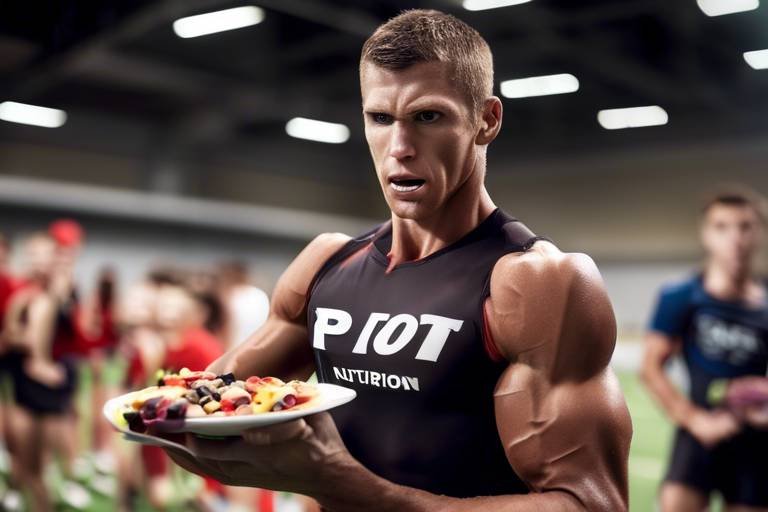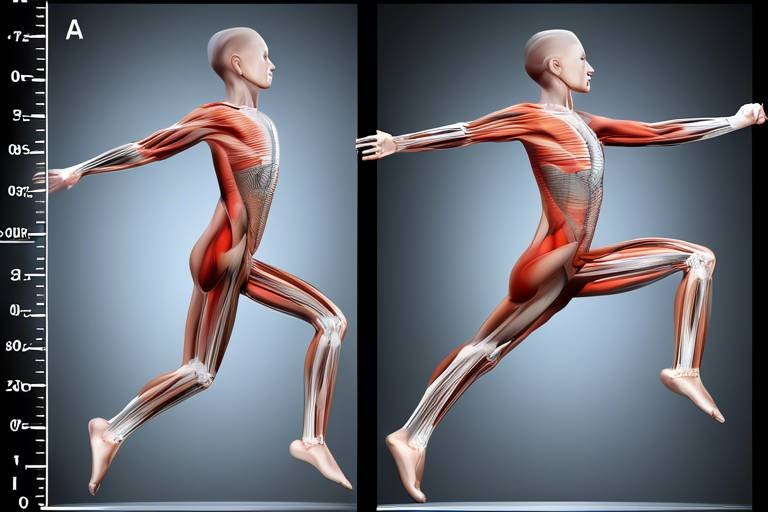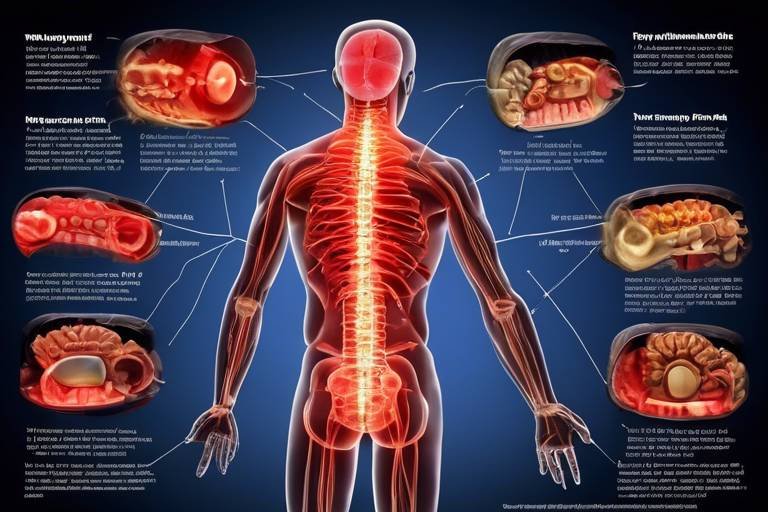The Role of Nutrition in Athletic Performance
Nutrition plays a crucial role in enhancing athletic performance, acting as the foundation upon which athletes build their physical capabilities. Just like a high-performance car requires premium fuel to run efficiently, athletes need the right nutrients to maximize their potential. The right balance of nutrients not only fuels the body but also aids in recovery, muscle growth, and overall well-being. Whether you’re a weekend warrior or a professional athlete, understanding how nutrition influences your performance can make a significant difference in your results.
At the core of athletic nutrition are macronutrients: carbohydrates, proteins, and fats. Each of these nutrients serves a unique purpose in your body. Carbohydrates are the primary source of energy, fueling your workouts and helping you maintain stamina during long sessions. Proteins play a vital role in repairing and building muscle tissues, especially after intense training. Meanwhile, healthy fats provide a concentrated source of energy and support various bodily functions, including hormone production. Balancing these macronutrients is essential for achieving optimal performance.
Moreover, hydration is another critical aspect that cannot be overlooked. Water is the lifeblood of athletic performance; it regulates body temperature, lubricates joints, and transports nutrients to cells. Without adequate hydration, even the most skilled athletes can experience a decline in performance. This is particularly true during endurance events where fluid loss can significantly impact strength and stamina. Therefore, understanding how to maintain proper hydration levels is vital for any athlete looking to perform at their best.
As we dive deeper into the specifics of nutrition, we will explore various dietary strategies, the importance of timing nutrient intake, and the role of micronutrients in supporting overall athletic health. By the end of this article, you will have a comprehensive understanding of how to leverage nutrition to enhance your athletic performance and recovery.
- What are the best sources of carbohydrates for athletes?
Complex carbohydrates such as whole grains, fruits, and vegetables are excellent sources for sustained energy. - How much protein do athletes need?
Generally, athletes should aim for 1.2 to 2.0 grams of protein per kilogram of body weight, depending on their training intensity and goals. - What are the signs of dehydration?
Common signs include thirst, dark urine, fatigue, and dizziness. Staying hydrated is essential for optimal performance.

Understanding Macronutrients
Macronutrients—carbohydrates, proteins, and fats—are the building blocks of our diet and play a crucial role in athletic performance. Think of them as the fuel that powers an athlete's body, enabling it to perform at its best. Each macronutrient serves a unique purpose and understanding these roles can help athletes optimize their performance and recovery.
Carbohydrates are often considered the primary source of energy for athletes. When you consume carbs, your body breaks them down into glucose, which is then used for energy during exercise. This is especially important for endurance athletes who rely on a steady supply of energy to sustain prolonged physical activity. Imagine running a marathon; without adequate carbohydrate stores, you might hit the infamous "wall," where your energy plummets, and your performance declines dramatically.
Then we have proteins, which are essential for muscle repair and growth. After an intense workout, your muscles undergo stress and tiny tears occur. Protein helps to repair these tears, making your muscles stronger and more resilient. This is why many athletes focus on protein intake post-workout—it's like giving your muscles a much-needed hug after a tough session. Foods rich in protein, such as chicken, fish, eggs, and legumes, can help facilitate this recovery process.
Lastly, fats are often misunderstood. While they have a reputation for being unhealthy, they are actually vital for hormone production and nutrient absorption. Healthy fats, like those found in avocados, nuts, and olive oil, provide a concentrated source of energy, especially during longer, low-intensity workouts. Think of fats as the slow-burning logs in a fire—they provide sustained energy over time, allowing you to keep going when your carbohydrate stores start to dwindle.
To sum it up, here's a quick overview of the three macronutrients:
| Macronutrient | Primary Function | Sources |
|---|---|---|
| Carbohydrates | Primary energy source | Pasta, rice, fruits, vegetables |
| Proteins | Muscle repair and growth | Meat, dairy, legumes, nuts |
| Fats | Hormone production, energy | Avocados, nuts, olive oil, fatty fish |
To maximize athletic performance, it's essential to strike a balance between these macronutrients. Each athlete's needs may vary based on their specific sport, training intensity, and individual goals. For instance, a sprinter may require a different macronutrient ratio compared to a marathon runner. Therefore, athletes should consider consulting with a nutritionist to tailor their diet to their unique requirements.
In conclusion, understanding macronutrients is key to unlocking your potential as an athlete. By fueling your body with the right balance of carbohydrates, proteins, and fats, you can enhance your performance, speed up recovery, and ultimately achieve your athletic goals.

The Importance of Hydration
When it comes to athletic performance, hydration is often the unsung hero. Think of your body as a high-performance engine; just like a car needs oil to run smoothly, your body needs water to function at its best. Staying hydrated is crucial not only for sustaining energy levels but also for optimizing physical output. Dehydration can lead to a significant drop in performance, affecting everything from endurance to strength. Did you know that losing just 2% of your body weight in fluid can impair performance? It's true! That's why understanding hydration is key for athletes looking to enhance their game.
Fluid balance plays a vital role in maintaining peak performance. When you sweat, you lose not just water but also essential electrolytes that help regulate muscle function and nerve signaling. This is why it's important to not only drink water but also replenish lost electrolytes. The interplay between hydration and performance can be likened to a delicate dance; if one partner falters, the entire routine can fall apart. So, how can athletes ensure they are adequately hydrated? Let's dive into some effective hydration strategies.
One effective strategy is to drink water consistently throughout the day rather than chugging large amounts right before a workout. This helps maintain a steady fluid balance. In addition, athletes should consider the timing of their fluid intake. For instance, consuming fluids before, during, and after exercise can significantly enhance performance and recovery. Here’s a quick breakdown:
| Timing | Recommendation |
|---|---|
| Before Exercise | Drink 16-20 ounces of water 2-3 hours prior. |
| During Exercise | Consume 7-10 ounces every 10-20 minutes. |
| After Exercise | Rehydrate with 16-24 ounces for every pound lost during exercise. |
In addition to water, athletes should consider incorporating beverages that contain electrolytes, especially during intense training sessions. Sports drinks can be beneficial, but it's essential to choose those with balanced electrolytes and minimal added sugars. Furthermore, foods such as fruits and vegetables can also contribute to hydration. Watermelon, cucumbers, and oranges are fantastic options that not only hydrate but also provide essential vitamins and minerals.
Now, let’s talk about electrolytes—those tiny but mighty minerals that help keep your body functioning smoothly. Sodium, potassium, calcium, and magnesium are just a few of the key players that help regulate fluid balance and muscle contractions. When you sweat, you lose these electrolytes, which can lead to cramps, fatigue, and decreased performance. To maintain optimal levels, athletes should focus on both hydration and electrolyte replenishment, especially during prolonged or intense workouts.
Wondering where to find these essential electrolytes? Here are some excellent dietary sources:
- Sodium: Found in table salt and processed foods.
- Potassium: Bananas, sweet potatoes, and spinach are great sources.
- Calcium: Dairy products, leafy greens, and fortified foods.
- Magnesium: Nuts, seeds, and whole grains.
Recognizing the signs of electrolyte imbalance is crucial for athletes. Common symptoms include:
- Cramps or spasms
- Fatigue and weakness
- Nausea or vomiting
- Headaches
If you notice any of these symptoms, it’s essential to address them promptly to avoid compromising your performance.
In conclusion, hydration is not just about quenching your thirst; it's a fundamental component of athletic performance. By understanding the importance of fluid balance, electrolyte replenishment, and optimal timing of nutrient intake, athletes can significantly enhance their physical capabilities and recovery. Remember, staying hydrated is a marathon, not a sprint!
Q: How much water should I drink daily?
A: It varies by individual, but a good rule of thumb is to aim for at least 8-10 cups (64-80 ounces) daily, increasing this amount if you are exercising heavily.
Q: Can I rely solely on thirst to guide my hydration?
A: While thirst is a good indicator, it's better to be proactive about hydration, especially during intense training sessions.
Q: What are the best drinks for hydration?
A: Water is excellent, but sports drinks with electrolytes can be beneficial during prolonged exercise. Coconut water is also a great natural alternative.
Q: How can I tell if I'm dehydrated?
A: Common signs include dark urine, dry mouth, fatigue, and dizziness. Always listen to your body!

Electrolyte Balance
When we talk about athletic performance, we often focus on macronutrients and hydration, but one of the unsung heroes in this equation is the balance of electrolytes. These tiny but mighty minerals—like sodium, potassium, calcium, and magnesium—play a crucial role in maintaining fluid balance, nerve function, and muscle contractions. Imagine trying to drive a car without oil; your engine would seize up, right? The same goes for your body and electrolytes. Without them, your performance can take a nosedive.
Electrolyte balance is particularly important during intense training sessions or competitions. When you sweat, you lose not just water but also these vital minerals. This loss can lead to muscle cramps, fatigue, and even more severe issues like heat exhaustion. So, how can athletes maintain their electrolyte levels? First and foremost, it's essential to listen to your body. If you're feeling sluggish or cramping, it might be a sign that your electrolyte levels are off.
To keep your electrolytes in check, consider incorporating a variety of foods and beverages into your diet. For instance, fruits like bananas and oranges are rich in potassium, while salty snacks can help replenish sodium levels. Sports drinks can also be beneficial, especially during prolonged physical activity. However, be cautious; not all sports drinks are created equal. Some are loaded with sugars that can do more harm than good.
Here’s a quick look at some common sources of electrolytes:
| Electrolyte | Food Sources |
|---|---|
| Sodium | Table salt, pickles, olives |
| Potassium | Bananas, spinach, sweet potatoes |
| Calcium | Dairy products, almonds, leafy greens |
| Magnesium | Whole grains, nuts, seeds |
Additionally, recognizing the signs of electrolyte imbalance is vital for athletes. Some common symptoms include:
- Muscle cramps
- Fatigue
- Nausea
- Headaches
- Dizziness
If you experience any of these symptoms, it’s important to address them promptly. Ignoring these signs can lead to decreased performance and even serious health issues. Think of your body as a finely tuned machine; if one part isn’t working properly, the whole system can falter.
In summary, maintaining electrolyte balance is essential for any athlete looking to optimize their performance. By being mindful of your electrolyte intake through diet and hydration, you can ensure that your body is equipped to handle the demands of training and competition. Remember, a well-fueled athlete is a successful athlete!
Q1: What are electrolytes, and why are they important?
A1: Electrolytes are minerals that carry an electric charge and are essential for many bodily functions, including muscle contractions and hydration. They help regulate fluid balance and are crucial for peak athletic performance.
Q2: How can I tell if I have an electrolyte imbalance?
A2: Common signs of electrolyte imbalance include muscle cramps, fatigue, nausea, headaches, and dizziness. If you experience these symptoms, it may be time to adjust your electrolyte intake.
Q3: What foods are high in electrolytes?
A3: Foods rich in electrolytes include bananas, spinach, dairy products, nuts, and table salt. Sports drinks can also help replenish electrolytes during intense workouts.
Q4: How much water should I drink to maintain electrolyte balance?
A4: Hydration needs vary by individual and activity level, but a general guideline is to drink enough to maintain clear or light-colored urine. During intense exercise, consider electrolyte drinks to replenish lost minerals.

Sources of Electrolytes
When it comes to maintaining optimal hydration and ensuring that your muscles function at their best, understanding the is essential. Electrolytes, such as sodium, potassium, calcium, and magnesium, play a pivotal role in muscle contraction, nerve function, and overall fluid balance in the body. Athletes, in particular, need to be mindful of their electrolyte intake, especially during intense training sessions or competitions where sweating can lead to significant losses.
One of the most effective ways to replenish electrolytes is through a well-balanced diet. Here are some of the best dietary sources:
- Fruits: Bananas are often touted as the go-to fruit for potassium, while oranges and watermelon are excellent for hydration and also provide a good dose of electrolytes.
- Vegetables: Leafy greens like spinach and kale are rich in calcium and magnesium. Root vegetables, such as sweet potatoes, also contribute to potassium levels.
- Dairy Products: Milk and yogurt are fantastic sources of calcium, which is vital for muscle function and bone health.
- Nuts and Seeds: Almonds, pumpkin seeds, and sunflower seeds are packed with magnesium and other essential minerals.
- Sports Drinks: While whole foods are the best sources, sports drinks can provide a quick and convenient way to replenish electrolytes, especially during prolonged exercise.
It's important to note that the need for electrolytes can vary based on individual factors such as sweat rate, exercise intensity, and duration. For example, a marathon runner may require different electrolyte sources compared to a weightlifter. Therefore, it's crucial to listen to your body and adjust your intake accordingly.
In addition to food sources, some athletes may opt for electrolyte supplements. These can come in various forms, including tablets, powders, or drinks. However, it's always recommended to consult with a healthcare professional or a registered dietitian before incorporating supplements into your routine, as they can help tailor your needs based on your specific activity levels and dietary habits.
In summary, ensuring adequate electrolyte intake through a combination of whole foods and, if necessary, supplements can significantly enhance athletic performance and recovery. By prioritizing these nutrient-rich foods, athletes can maintain their energy levels, prevent cramps, and support overall health, allowing them to perform at their peak.
1. What are electrolytes, and why are they important for athletes?
Electrolytes are minerals in your body that carry an electric charge. They are crucial for maintaining fluid balance, muscle contractions, and nerve function. For athletes, proper electrolyte balance helps prevent dehydration and muscle cramps during intense physical activity.
2. How can I tell if I need more electrolytes?
Signs that you may need more electrolytes include muscle cramps, fatigue, dizziness, and excessive thirst. If you experience these symptoms, consider adjusting your diet or hydration strategy to include more electrolyte-rich foods or drinks.
3. Are sports drinks necessary for hydration?
While sports drinks can be beneficial for replenishing electrolytes after prolonged exercise, they are not always necessary for everyone. For shorter workouts or casual exercise, water is often sufficient. However, during intense or extended activities, sports drinks can help restore electrolyte levels more quickly.
4. Can I get enough electrolytes from food alone?
Yes, a well-balanced diet rich in fruits, vegetables, dairy, nuts, and seeds can provide adequate electrolytes for most people. However, athletes with high sweat rates or those engaging in prolonged exercise may benefit from additional sources, including supplements.

Signs of Electrolyte Imbalance
Recognizing the is crucial for athletes striving to maintain optimal performance levels. Electrolytes, such as sodium, potassium, calcium, and magnesium, play a vital role in muscle function, hydration, and overall health. When these essential minerals are out of balance, athletes may experience a range of symptoms that can hinder their performance and recovery.
Some common signs of electrolyte imbalance include:
- Muscle Cramps: Sudden and involuntary muscle contractions can be a clear indicator that your electrolyte levels are off. Athletes often experience cramps during intense workouts, signaling a need for immediate attention.
- Fatigue: Feeling unusually tired or lethargic? This could be due to a lack of electrolytes, which are essential for energy production and muscle function.
- Dizziness or Lightheadedness: If you find yourself feeling dizzy, especially during or after exercise, it might be a sign that your body is struggling with electrolyte balance.
- Headaches: Dehydration and electrolyte imbalances can lead to headaches, which can be particularly detrimental during competitions or training sessions.
- Nausea: Feeling nauseous can be another symptom of an electrolyte imbalance, often accompanied by other signs like fatigue and dizziness.
It’s important to note that these symptoms can vary from person to person, and some athletes may experience more severe reactions than others. For instance, athletes who sweat profusely may be at a higher risk of experiencing these symptoms due to the loss of electrolytes through sweat. Therefore, it's vital to listen to your body and take these signs seriously.
To prevent electrolyte imbalances, athletes should focus on maintaining a well-rounded diet rich in fruits, vegetables, and mineral-rich foods. Additionally, staying hydrated before, during, and after exercise is essential. If you notice any of these symptoms, consider adjusting your diet or hydration strategy, and consult with a healthcare professional if symptoms persist.
In conclusion, being aware of the signs of electrolyte imbalance can help athletes take proactive steps to maintain their health and performance. Recognizing these symptoms early allows for timely interventions, ensuring that athletes can continue to push their limits without compromising their well-being.
1. What are electrolytes and why are they important for athletes?
Electrolytes are minerals in your body that carry an electric charge. They are essential for various bodily functions, including muscle contraction, hydration, and maintaining pH levels. For athletes, maintaining proper electrolyte balance is crucial for optimal performance and recovery.
2. How can I know if I have an electrolyte imbalance?
Common signs of an electrolyte imbalance include muscle cramps, fatigue, dizziness, headaches, and nausea. If you experience any of these symptoms, it may be time to reassess your hydration and nutrition strategies.
3. What foods are high in electrolytes?
Foods rich in electrolytes include bananas (potassium), spinach (magnesium), dairy products (calcium), and table salt (sodium). Incorporating a variety of these foods into your diet can help maintain balanced electrolyte levels.
4. How can I prevent electrolyte imbalances during exercise?
To prevent imbalances, ensure you hydrate adequately before, during, and after exercise. Consuming electrolyte-rich drinks or foods during long workouts can also help maintain balance.

Timing of Nutrient Intake
When it comes to athletic performance, timing is everything. Just like a well-rehearsed dance, the synchronization of nutrient intake can significantly enhance your performance and recovery. Imagine your body as a finely tuned engine; it needs the right fuel at the right time to run smoothly. Consuming macronutrients—carbohydrates, proteins, and fats—at strategic intervals can make a world of difference in how you feel during workouts and how effectively you recover afterward.
To maximize your performance, consider the following timing strategies:
- Pre-Workout Nutrition: Fueling your body before exercise is crucial. Consuming a meal rich in carbohydrates and moderate in protein about 2-3 hours prior to your workout can provide the energy needed for optimal performance. Think of it as filling up your gas tank before a long road trip.
- During Workout Nutrition: For longer workouts, especially those exceeding an hour, incorporating quick-digesting carbohydrates can help maintain energy levels. Sports drinks, gels, or even bananas can serve as quick energy sources. It's like having a snack break during a marathon—keeping your energy up is key!
- Post-Workout Recovery: After your workout, your muscles are crying out for nutrients to repair and recover. Consuming a combination of protein and carbohydrates within 30 minutes post-exercise can kickstart the recovery process. A protein shake with a banana, or a turkey sandwich on whole grain bread, are excellent options to consider.
But why is nutrient timing so essential? Well, during exercise, your body undergoes various physiological changes. For instance, glycogen stores become depleted, and muscle fibers experience tiny tears that need repair. By strategically timing your nutrient intake, you're not just refueling; you're also providing your body with the tools it needs to rebuild and strengthen those muscles.
To further illustrate the importance of nutrient timing, let’s take a look at a sample schedule:
| Time | Type of Meal | Suggested Foods |
|---|---|---|
| 2-3 hours before workout | Pre-Workout | Oatmeal with fruit, Chicken and rice |
| During workout | During Exercise | Sports drink, Energy gels, Bananas |
| 30 minutes post-workout | Post-Workout | Protein shake, Greek yogurt with honey |
In summary, the timing of nutrient intake is a powerful tool in an athlete's arsenal. Like a conductor leading an orchestra, you must ensure that each nutrient comes in at the right moment to create a beautiful symphony of performance and recovery. Remember, it’s not just about what you eat but also when you eat it. By mastering the art of nutrient timing, you’ll be well on your way to achieving your athletic goals.
Q: How long before a workout should I eat?
A: Ideally, you should eat a balanced meal 2-3 hours before your workout. This gives your body ample time to digest and convert food into energy.
Q: Can I eat during my workout?
A: Yes! For workouts longer than an hour, quick-digesting carbohydrates can help maintain energy levels. Options include sports drinks or energy gels.
Q: What should I eat after exercising?
A: A combination of protein and carbohydrates within 30 minutes post-exercise is ideal for recovery. Think of a protein shake or a meal like a chicken sandwich.

Micronutrients and Athletic Performance
When it comes to athletic performance, we often focus on macronutrients like carbohydrates, proteins, and fats. However, let's not overlook the unsung heroes of nutrition: micronutrients. These tiny but mighty vitamins and minerals play a crucial role in how our bodies function, especially when we push them to their limits. Think of micronutrients as the oil in a well-tuned engine; without them, everything can grind to a halt, no matter how powerful the engine is.
Vitamins and minerals are essential for various bodily functions, including energy production, immune support, and recovery after exercise. For athletes, the right balance of these nutrients can mean the difference between a personal best and a disappointing performance. For instance, Vitamin D is vital for bone health, while Vitamin C can help reduce muscle soreness and speed up recovery. Similarly, minerals like calcium and magnesium are indispensable for muscle contraction and preventing cramps.
So, what should athletes focus on when it comes to micronutrients? Here’s a quick breakdown of some key players:
| Micronutrient | Function | Food Sources |
|---|---|---|
| Vitamin D | Bone health, immune function | Sunlight, fatty fish, fortified dairy |
| Vitamin C | Antioxidant, aids in recovery | Citrus fruits, berries, bell peppers |
| Calcium | Bone strength, muscle function | Dairy products, leafy greens, almonds |
| Magnesium | Energy production, muscle contraction | Nuts, seeds, whole grains |
Incorporating these micronutrients into an athlete's diet isn’t just about popping a multivitamin. Instead, it's about making smart food choices that provide a variety of nutrients. A colorful plate filled with fruits and vegetables not only looks appealing but also ensures a wide range of vitamins and minerals. For example, a spinach salad topped with strawberries and walnuts can deliver a potent mix of Vitamin C, magnesium, and healthy fats, all of which support athletic performance.
Moreover, let’s not forget that the body’s need for these micronutrients can increase with the intensity of training. Athletes may require more of certain vitamins and minerals compared to the average person. This increased need highlights the importance of regularly monitoring dietary intake to ensure all nutritional bases are covered.
In conclusion, while macronutrients often steal the spotlight in discussions about sports nutrition, micronutrients deserve equal attention. They are essential for maintaining energy levels, supporting recovery, and enhancing overall athletic performance. By prioritizing a balanced diet rich in vitamins and minerals, athletes can unlock their true potential and stay at the top of their game.
- What are micronutrients? Micronutrients are vitamins and minerals that the body needs in small amounts to function properly.
- Why are micronutrients important for athletes? They support energy production, recovery, and overall health, which are crucial for optimal athletic performance.
- How can I ensure I'm getting enough micronutrients? Focus on a varied diet rich in fruits, vegetables, whole grains, and lean proteins.

Key Vitamins for Athletes
When it comes to athletic performance, vitamins are the unsung heroes that often get overshadowed by macronutrients like carbohydrates, proteins, and fats. However, they play a crucial role in optimizing energy levels, enhancing recovery, and supporting overall health. For athletes, ensuring an adequate intake of specific vitamins can mean the difference between a good performance and a great one. Let’s break down some of the key vitamins that every athlete should be aware of.
Vitamin B Complex is essential for athletes as it helps convert carbohydrates into energy. This group includes several vitamins, such as B1 (thiamine), B2 (riboflavin), B3 (niacin), B6 (pyridoxine), and B12 (cobalamin). Each of these vitamins plays a unique role in energy metabolism and red blood cell production, which is vital for endurance and overall stamina. A deficiency in any of these can lead to fatigue and decreased performance.
Another important vitamin is Vitamin C, known for its antioxidant properties. It helps combat oxidative stress that occurs during intense physical activity. This vitamin not only aids in recovery by reducing muscle soreness but also supports the immune system, which is crucial for athletes who are often training hard and pushing their limits. A diet rich in fruits and vegetables can provide sufficient Vitamin C, but supplementation can also be beneficial during intense training periods.
Vitamin D is often referred to as the "sunshine vitamin" because our bodies produce it when exposed to sunlight. For athletes, Vitamin D is critical for bone health and muscle function. It helps improve strength and may even enhance performance. Many athletes, especially those training indoors or in less sunny climates, may find themselves deficient in this vitamin, making it essential to monitor levels and consider supplementation if necessary.
Lastly, let’s not forget about Vitamin E, another powerful antioxidant. It plays a role in protecting cells from damage caused by free radicals, which are produced during strenuous exercise. Additionally, Vitamin E supports immune function and may help in the recovery process post-exercise. Foods rich in Vitamin E include nuts, seeds, and green leafy vegetables, making it relatively easy to incorporate into an athlete’s diet.
In summary, here’s a quick look at the key vitamins and their roles:
| Vitamin | Role in Athletic Performance | Sources |
|---|---|---|
| B Complex | Energy metabolism and red blood cell production | Whole grains, meat, eggs, dairy |
| C | Antioxidant, aids recovery, supports immune function | Citrus fruits, berries, bell peppers |
| D | Bone health, muscle function | Sunlight, fortified foods, fatty fish |
| E | Cell protection, immune support | Nuts, seeds, green leafy vegetables |
Incorporating these vitamins into your daily regimen can significantly impact your athletic performance and overall health. Remember, a well-rounded diet rich in fruits, vegetables, whole grains, lean proteins, and healthy fats will not only help you meet your nutritional needs but also enhance your training outcomes. So, next time you’re fueling up for a workout, think about those essential vitamins working behind the scenes to help you achieve your goals!
- How can I ensure I'm getting enough vitamins as an athlete?
Focus on a balanced diet rich in whole foods, and consider consulting a nutritionist for personalized advice. - Can I take vitamin supplements instead of getting vitamins from food?
While supplements can help, they should not replace whole food sources, as food provides additional nutrients and benefits. - What are the signs of vitamin deficiencies?
Common signs include fatigue, muscle weakness, and frequent illness. If you suspect a deficiency, consult a healthcare professional.

Minerals and Their Impact
When it comes to athletic performance, minerals are often the unsung heroes, quietly working behind the scenes to ensure everything runs smoothly. These essential nutrients play a critical role in various bodily functions, from muscle contraction to bone health. Without adequate mineral intake, athletes may find themselves facing a myriad of challenges, including decreased performance and increased risk of injury. So, let's dive deeper into the impact of minerals on athletic prowess.
First off, let's talk about calcium. This mineral is not just vital for bone strength; it also plays a key role in muscle contraction. When you think about it, every time you lift that weight or sprint down the track, calcium is there, helping your muscles contract and relax. If you're not getting enough calcium, you could be setting yourself up for muscle cramps or even more serious injuries. Dairy products, leafy greens, and fortified foods are excellent sources of calcium that athletes should incorporate into their diets.
Next on the list is magnesium, another powerhouse mineral that contributes to energy production, muscle function, and recovery. It helps convert carbohydrates and fats into energy, which is crucial during those intense training sessions. Moreover, magnesium aids in muscle relaxation, helping to prevent cramps and soreness after workouts. Foods rich in magnesium include nuts, seeds, whole grains, and green leafy vegetables. So, if you want to keep your energy levels high and muscle soreness low, make sure you're getting enough magnesium!
Another mineral that deserves a spotlight is potassium. This mineral is essential for maintaining proper fluid balance and nerve function. It helps regulate heart rhythm and muscle contractions, making it crucial for athletes engaged in endurance sports. Low potassium levels can lead to fatigue, weakness, and even muscle cramps. Bananas are often touted as the go-to source for potassium, but you can also find it in sweet potatoes, avocados, and spinach. Keeping your potassium levels in check can significantly impact your performance and recovery.
Lastly, we can't forget about iron. This mineral is vital for transporting oxygen in the blood, which is essential for endurance athletes. Without sufficient iron, your body can't efficiently deliver oxygen to your muscles, leading to fatigue and decreased performance. Athletes, especially women, are often at risk of iron deficiency, so it's important to consume iron-rich foods like red meat, beans, lentils, and fortified cereals. Pairing these foods with vitamin C sources can enhance iron absorption, making your meals even more effective.
In summary, minerals are not just supplementary; they are fundamental to achieving peak athletic performance. A well-balanced diet that includes a variety of mineral-rich foods can help athletes maintain optimal health, enhance performance, and recover effectively. To ensure you're meeting your mineral needs, consider keeping a food diary or consulting with a nutritionist who can help tailor a plan that works for you.
- What are the best sources of calcium for athletes?
Dairy products, leafy greens, and fortified foods are excellent sources of calcium. - How does magnesium help in recovery?
Magnesium aids in muscle relaxation and helps convert carbohydrates and fats into energy. - Why is potassium important for athletes?
Potassium regulates fluid balance and muscle contractions, crucial for endurance. - What are the symptoms of iron deficiency?
Fatigue, weakness, and decreased performance are common symptoms of iron deficiency.
Frequently Asked Questions
- How do macronutrients affect athletic performance?
Macronutrients—carbohydrates, proteins, and fats—are the building blocks of energy for athletes. Carbs are like the fuel in your car, giving you the energy to go the distance. Proteins help repair and build muscles, acting like the construction crew after a big race. Fats provide long-lasting energy, especially during endurance events. Balancing these nutrients is essential for optimizing performance.
- Why is hydration important for athletes?
Hydration is the lifeblood of athletic performance! Staying hydrated helps maintain endurance, strength, and overall output. Just imagine trying to run a marathon without water—your body would feel like a deflated balloon! Proper hydration ensures that your muscles function optimally and can prevent fatigue and cramping during intense workouts.
- What are electrolytes and why do athletes need them?
Electrolytes are minerals that help regulate muscle function and hydration. Think of them as the electrical wiring in your body that keeps everything connected and functioning. When you sweat, you lose these vital minerals, which can lead to cramps and fatigue. Ensuring a balanced intake of electrolytes is crucial for maintaining peak performance during training and competitions.
- What are the best sources of electrolytes for athletes?
Electrolytes can be found in various foods and drinks. Some of the best sources include bananas, which are rich in potassium, and sports drinks that replenish sodium and magnesium. Don't forget about coconut water and leafy greens, which also pack a punch of electrolytes. Keeping these in your diet can help you stay on top of your game!
- How can I tell if I have an electrolyte imbalance?
Signs of electrolyte imbalance can include muscle cramps, fatigue, dizziness, and even headaches. If you feel like your body is throwing a tantrum during workouts, it might be time to check your electrolyte levels. Addressing these symptoms promptly is essential to ensure you can keep pushing your limits without hitting a wall.
- What is nutrient timing and how does it benefit athletes?
Nutrient timing is all about when you consume your macronutrients to maximize their benefits. Think of it like scheduling a meeting for the best results; timing is everything! Consuming carbs and proteins before, during, and after workouts can enhance recovery and performance, ensuring your body gets the fuel it needs right when it needs it.
- Which vitamins are particularly important for athletes?
Certain vitamins play a key role in energy metabolism and recovery. For instance, B vitamins help convert food into energy, while vitamin D is crucial for bone health. Think of vitamins as the support team that keeps the athletes running smoothly. A well-rounded diet rich in fruits, vegetables, and whole grains can help ensure you’re getting the vitamins you need.
- What minerals should athletes focus on for better performance?
Minerals like calcium, magnesium, and iron are essential for muscle contraction and overall health. Calcium strengthens bones, magnesium helps with muscle function, and iron is crucial for oxygen transport in the blood. These minerals are like the unsung heroes of athletic performance, quietly working behind the scenes to keep you at your best.


















